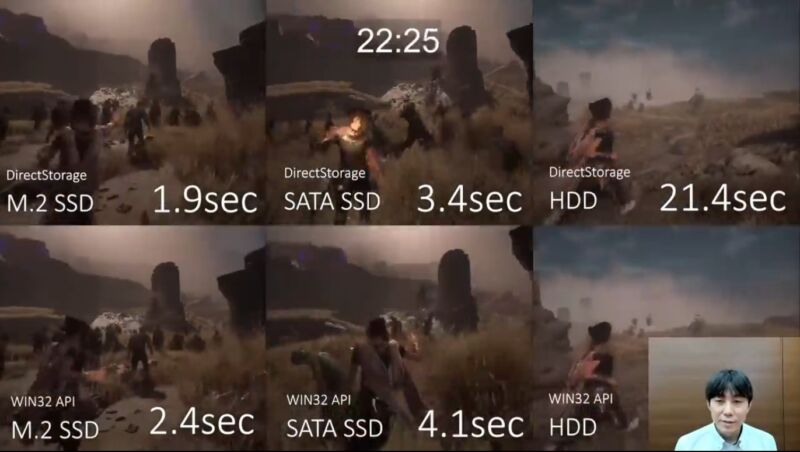
Enlarge / Microsoft's DirectStorage API makes a measurable, if minor, difference when it comes to loading PC games. (credit: Luminous Productions via The Verge)
Microsoft's DirectStorage API promises to speed up game-load times, both on the Xbox Series X/S and on Windows PCs (where Microsoft recently exited its developer-preview phase). One of the first games to demonstrate the benefits of DirectStorage on the PC is Square Enix's Forspoken, which was shown off by Luminous Productions technical director Teppei Ono at GDC this week. As reported by The Verge, Ono said that, with a fast NVMe SSD and DirectStorage support, some scenes in Forspoken could load in as little as one second. That is certainly a monstrous jump from the days of waiting for a PlayStation 2 to load giant open-world maps from a DVD.
As a demonstration of DirectStorage, though, Forspoken's numbers are a mixed bag. On the one hand, the scenes Ono demonstrated do clearly demonstrate DirectStorage loading scenes more quickly on the same hardware, compared to the legacy Win32 API—from 2.6 seconds to 2.2 seconds in one scene, and from 2.4 seconds to 1.9 seconds in another. Forspoken demonstrated performance improvements on older SATA-based SSDs as well, despite being marketed as a feature that will primarily benefit NVMe drives—dropping from 5.0 to 4.6 seconds in one scene, and from 4.1 to 3.4 seconds in another. Speed improvements for SATA SSDs have been limited for the better part of a decade now because the SATA interface itself (rather than the SSD controller or NAND flash chips) has been holding them back. So eking out any kind of measurable improvement for those drives is noteworthy.
On the other hand, Ono's demo showed that game-load time wasn't improving as dramatically as the raw I/O speeds would suggest. On an NVMe SSD, I/O speeds increased from 2,862MB/s using Win32 to 4,829MB/s using DirectStorage—nearly a 70 percent increase. But the load time for the scene decreased from 2.1 to 1.9 seconds. That's a decrease which wouldn't be noticeable even if you were trying to notice it.
Read 2 remaining paragraphs | Comments
https://ift.tt/sP8RWSq
Comments
Post a Comment